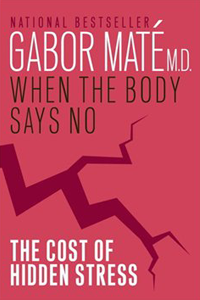The author, Dr. Gabor Maté is Canadian. He is a medical doctor that practiced as family doctor in Vancouver and also worked in clinic in downtown Vancouver clinic where he dealt with drug addiction patients, mental illness patients and HIV patients.
In the When the body says NO he puts together scientific research, case histories and his experience on the subject of how emotions and psychological stress play a powerful role in the onset of chronic illness, including breast cancer, prostate cancer, multiple sclerosis, Alzheimer’s disease and many others. By presenting scientific evidence and his case studies he aims to enlighten and empower people to promote their own healing. Mate explores the link between the mind and the body.
Maté dives deeply into his patient’s family histories and finding that life-threatening diseases existed side by side with such things as alcoholism, neglect, anger and repression of emotion. He compares his case studies and draws conclusions and presents scientific evidence about diseases.
He shares stories of famous people like like Ronald Reagan (Alzheimer’s) and Lance Armstrong (testicular cancer). He stresses the link between emotions and illness.
In his book he discusses topics like – Can a person literally die of loneliness? And Is there a connection between the ability to express emotions and Alzheimer’s disease?
He is also suggesting that patients with certain diseases such as breast cancer, ALS and MS, have distinctive personalities. He talks about power of negative and positive thinking.
Some examples of the diseases that he discussed are:
ALS -he found that his ALS patients have the following characteristics – are not expressing their feelings, have fear of abandonment; have inability to ask or receive help, are self-driven and are the most pleasant people
Breast Cancer patients when asked what they think caused their cancer, 42% said that stress caused their cancer. He also mentioned the evidence is that genetics cause cancer is around only 7%.
Mate says that stress leads to disruption of homeostasis. Chronic disruption results in ill health. Emotional competence is what we need to develop to protect our self from hidden stresses. We need to create emotional competence as preventive medicine.
Emotional competence requires:
- a capacity to feel our emotions, so that we are aware when we are experiencing stress
- an ability to express our emotions effectively, assert our needs, maintain integrity and emotional boundaries
- a facility to differentiate between psychological reactions that are relevant to present situations and those that represent residue from past
- an awareness of genuine needs that do require satisfaction, rather than their repression for the sake of gaining acceptance or approval of others
Stress occurs in the absence of these criteria.
Dr. Maté invites readers be their own health advocates by pursuing emotional competence in seven areas which he refers to as The Seven A’s of Healing : principles of healing and the prevention of illness from hidden stress . These seven As are – acceptance, awareness, anger, autonomy, attachment, assertion, and affirmation.
- Acceptance – accept/recognize how things are, having passionate relationship with oneself
- Awareness – emotion of truth recognition – picking up emotional clues, tone, body language, mannerisms.
- Anger – repression of anger predisposes to disease but expression of anger has shown to promote healing
- Autonomy – development of internal center of control, having boundaries
- Attachment – connection to the world, we need social contact, it is vital for healing
- Assertion – we are who we are; refusing to do something we do not wish to do and letting go the need to act
- Affirmation – making positive statements, moving toward something of value; value our own creative self
I found the book difficult to read, not because how it is written or the language used, but I got really emotional reading it as I was relating to the stories in the book. Since I have experienced a few traumas and serious illnesses in my life I was seeing the connections. I had to put down many times and come back to the book and keep reading.
I would most certainly recommend it to clients who are experiencing stress in their lives and dismissing the stress as it is not a big deal. There is some medical terminology but overall is easy to read.


